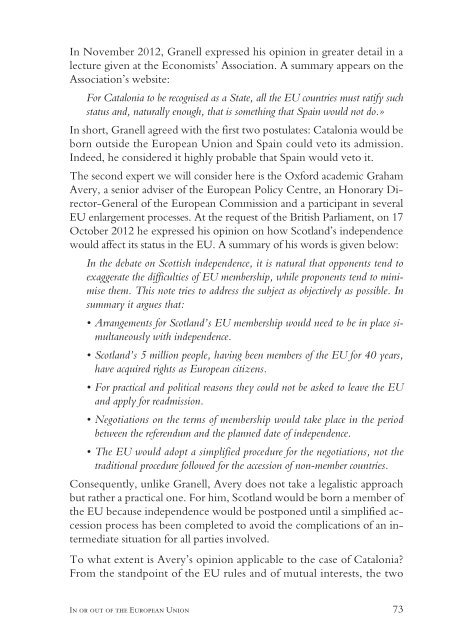The Economy of Catalonia
the_economy_of_catalonia._questions_and_answers_on_the_economic_impact_of_independence
the_economy_of_catalonia._questions_and_answers_on_the_economic_impact_of_independence
Create successful ePaper yourself
Turn your PDF publications into a flip-book with our unique Google optimized e-Paper software.
In November 2012, Granell expressed his opinion in greater detail in a<br />
lecture given at the Economists’ Association. A summary appears on the<br />
Association’s website:<br />
For <strong>Catalonia</strong> to be recognised as a State, all the EU countries must ratify such<br />
status and, naturally enough, that is something that Spain would not do.»<br />
In short, Granell agreed with the first two postulates: <strong>Catalonia</strong> would be<br />
born outside the European Union and Spain could veto its admission.<br />
Indeed, he considered it highly probable that Spain would veto it.<br />
<strong>The</strong> second expert we will consider here is the Oxford academic Graham<br />
Avery, a senior adviser <strong>of</strong> the European Policy Centre, an Honorary Director-General<br />
<strong>of</strong> the European Commission and a participant in several<br />
EU enlargement processes. At the request <strong>of</strong> the British Parliament, on 17<br />
October 2012 he expressed his opinion on how Scotland’s independence<br />
would affect its status in the EU. A summary <strong>of</strong> his words is given below:<br />
In the debate on Scottish independence, it is natural that opponents tend to<br />
exaggerate the difficulties <strong>of</strong> EU membership, while proponents tend to minimise<br />
them. This note tries to address the subject as objectively as possible. In<br />
summary it argues that:<br />
• Arrangements for Scotland’s EU membership would need to be in place simultaneously<br />
with independence.<br />
• Scotland’s 5 million people, having been members <strong>of</strong> the EU for 40 years,<br />
have acquired rights as European citizens.<br />
• For practical and political reasons they could not be asked to leave the EU<br />
and apply for readmission.<br />
• Negotiations on the terms <strong>of</strong> membership would take place in the period<br />
between the referendum and the planned date <strong>of</strong> independence.<br />
• <strong>The</strong> EU would adopt a simplified procedure for the negotiations, not the<br />
traditional procedure followed for the accession <strong>of</strong> non-member countries.<br />
Consequently, unlike Granell, Avery does not take a legalistic approach<br />
but rather a practical one. For him, Scotland would be born a member <strong>of</strong><br />
the EU because independence would be postponed until a simplified accession<br />
process has been completed to avoid the complications <strong>of</strong> an intermediate<br />
situation for all parties involved.<br />
To what extent is Avery’s opinion applicable to the case <strong>of</strong> <strong>Catalonia</strong>?<br />
From the standpoint <strong>of</strong> the EU rules and <strong>of</strong> mutual interests, the two<br />
In or out <strong>of</strong> the European Union 73


